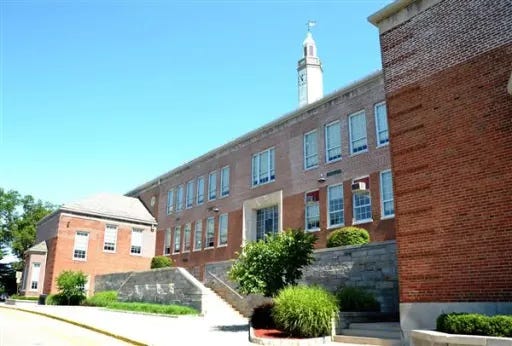Commentary: The strange case of the coach and the school board member.
An alarm was accidentally set off at PVC on an early Sunday morning in February. The individuals involved are not willing to say what they were doing there. Why not?
A lot of eyebrows were raised in the village in early February when the Croton police blotter reported the following incident at Pierre Van Cortlandt Middle School, especially since it took place early on a Sunday morning:
Date/Time: 2/2/25 7:26am
Location: Glen Place
Call Type: Alarm
Narrative: Alarm company reported an activation at the PVC Middle School. Patrols dispatched. Patrols report alarm set off in error by board member and coach.
Of course, in a small village like ours, raising one’s eyebrows is part of the culture, even if some think that everyone should just mind their own business most of the time.
However, and this only makes things worse, it is the general custom of both the village and the school district to seldom volunteer any information that could be even the slightest bit embarrassing. We saw an example of that earlier this week in the case of the rent increase at Maple Commons, which only came to public light because local media looked into reports about it.
As a result, the details of what happened that Sunday morning have remained obscured. Unfortunately, they may continue to be, at least for the time being.
However, the Chronicle, whose eyebrows are professionally elevated 24/7, wanted to know. Our New York State Freedom of Information (FOIL) requests to both the district and the village (for the police reports) have revealed some details.
According to the police report, the “coach” and the “board member” were James Lucadamo, a third grade teacher at CET, and Croton-Harmon school board member Omar Mayyasi, respectively. The alarm that was accidentally activated was apparently located on the stairs near the school’s sewing room. Two Croton officers responded to a call from the alarm security company located in Scarsdale, Esterlyn Duran and Kevin Ward.
(Interestingly, the documents we received from the school district mentioned the incident but did not name Mayyasi and Lucadamo. We were told that the district possessed no documents naming the board member and the coach involved.)
We also received recordings of four short police radio transmissions as part of the FOIL production. In one of them, an officer is heard saying that some kind of “coaching event” had been taking place at PVC when the alarm went off.
In our view, such an incident is a matter of public interest, for a number of obvious reasons. Among them are school security, proper use of facilities by district personnel, perhaps even the reliability of the alarm system (which might actually be pretty good, since false alarms can be a good test of such a system.)
It is also a matter of public interest because after the item appeared on the police blotter, there was a lot of chatter about it on village social media and via word of mouth. In other words, the public—or at least part of it—was interested to know. And when it comes to our schools and what goes on in them, the public has a clear right to know, even if in some cases the motivation is merely idle curiosity. Our Middle School is public property.
Were there children there at PVC at 7:30 am on a Sunday morning? Perhaps, perhaps not. Or was Lucadamo coaching board member Mayyasi in some way?
We don’t know.
It was not for lack of trying to find out. We sent messages to both Omar Mayyasi and James Lucadamo asking them to tell us exactly what they were doing there. We copied the message to Mayyasi to school board president Ana Teague, because the board has a policy that only its president is supposed to make comments to the press.
We did not receive any responses despite repeated attempts. That might be understandable in Lucadamo’s case, because he is probably not authorized to talk to the media. But Mayyasi’s silence, or Teague’s, would be another matter.
We can’t say we were surprised. For nearly a year now, the Board of Education, as well as school superintendent Stephen Walker, have had a policy and practice of not responding to any queries or requests for comment from the Chronicle.
This policy arose after this publication published several articles that were implicitly or explicitly critical of the district and its leadership, and which caused embarrassment to those officials. As regular readers know, these include stories about the school workers’ fight for a better contract, and the long delays in installing air conditioning at the elementary school. We know from numerous sources that the Chronicle’s persistent reporting and editorializing about the school workers played an important role in the district finally relenting and giving them a deal they could live with.
According to FOIL documents we received last year, board member Neal Haber, who is an attorney, did some research into the question of whether the Chronicle was a real journalistic endeavor and whether its editor was a “real” journalist. (Apparently Haber did not know that the editor of the Chronicle has been a working journalist for major publications for 47 years, or that he had taught journalism for many years at NYU, Boston University, and City College of New York.)
Haber concluded, consistent with a lot of First Amendment judicial precedent, that government officials cannot decide on their own who is a journalist and who is not. This is a basic First Amendment principle, and a number of courts at both the state and federal level have upheld it.
Right around the time that Haber was doing his research, we had some direct email exchanges with Ana Teague (copied to the board and the superintendent) about whether the Chronicle was a real media outlet—something that Teague had questioned. After some discussion, Teague dropped her original claim that it was not.
Teague also asked us if it were not true that the board and the district had the right to decline to comment when asked to do so. We agreed that this was allowed, but warned her and other board members against what is known as “First Amendment retaliation”—that is, withholding information from journalists because officials don’t like what they are publishing.
Since that time, the district’s clear policy and practice has been to not respond at all to our requests for comment. But it has designated the district clerk, Denise Bisaccia, as a de facto public information officer to respond to our requests for specific information. We have no complaints about her responsiveness. Bisaccia is also the records access officer for FOIL purposes.
(The district’s communications consultant, Jackie Burton, very occasionally responds to specific queries as well; for example, she did so during the recent school district elections. But Burton does not respond to requests for comment, even though that is part of her job description.)
All of this might not matter as much if there were other media outlets doing routine reporting on the school district and asking at times uncomfortable questions. But unfortunately, at the present time, there are not. So, as with the village of Croton-on-Hudson, the Chronicle has become pretty much the only game in town when it comes to that kind of reporting. Indeed, the only reason the Chronicle exists at all is because there was a need for such reporting and we were urged by a number of people in the community to try and fill that gap.
The end result is not only that the community is deprived of certain information it has a right to, but that public officials are attempting to control the flow of information to that community. Many local residents, including many in the village and school district, are critical of the Trump administration for what they see as its attempts to suppress freedom of speech and the press. But in essence, we have a similar attitude from at least some public officials in our locality.
This all brings us back to the case of the coach and the board member. If they were engaged in a “coaching event” at 7:30 am on a Sunday morning, why not just tell us about it? That would resolve all mysteries, counter all rumors, and demonstrate that all of the speculation about the incident was silly in the end. Perhaps the Chronicle itself would end up looking silly for even raising these questions, something we think district officials might actually enjoy.
If they were doing something they were not supposed to be doing at PVC, the public obviously has a right to know. By refusing to answer any questions about this incident—which was publicly reported on the Croton police blotter and thus is a public matter by definition and by law—the school district and its board erode trust, encourage rumors, and violate their responsibilities as public officials to be fully transparent.
And in the end, they become the silly ones.
Update:
*********************************************************************************************************
To share this post, or to share The Croton Chronicle, please click on these links.
Comments policy: Please be polite and respectful at all times.







Just an additional comment here, although it is really implied in the article. The school district has been doubly stupid here. First of all, when the police blotter item first appeared—which did not make a reference to a coaching event—the district should have been proactive and realized that everyone was going to wonder what was going on. They should have put out a statement. Then, once a reporter tries to figure out what did go on, they stonewall and refuse to comment at all—thus just increasing the suspicions and rumors. The district has a consulting communications person, and I have suggested to her more than once that the PR policy is not smart. But here we are, again.
This seems like a case of the school district and the Board of Education just being plain stupid. Why not have our tax dollar funded PR consultant issue a statement about the incident for the sake of transparency??